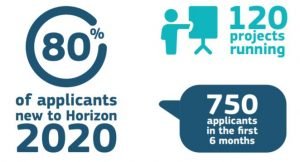 The Next Generation Internet (NGI) initiative aims to shape the development of the Internet of tomorrow into an Internet of humans that responds to people’s fundamental needs, including trust, security and inclusion, and reflects the values and the norms that we enjoy in Europe.
The Next Generation Internet (NGI) initiative aims to shape the development of the Internet of tomorrow into an Internet of humans that responds to people’s fundamental needs, including trust, security and inclusion, and reflects the values and the norms that we enjoy in Europe.
The mission of NGI is to re-imagine and re-engineer the Internet. The information age should enable human potential, mobility and creativity in an inclusive way – while dealing responsibly with our natural resources.
The NGI comprises an ambitious research and innovation programme with an EC investment of more than €250m between 2018 and 2020. Focus is on advanced technology including privacy and trust, search and discovery, decentralised architectures, blockchain, IoT, social media, interactive technologies, as well as technologies supporting multilingualism and accessibility.
Supporting Internet Innovators
 The NGI initiative funds European innovative research projects that make it possible to imagine and develop a new Internet that is safer, more open, more respectful of people and more useful to all citizens.
The NGI initiative funds European innovative research projects that make it possible to imagine and develop a new Internet that is safer, more open, more respectful of people and more useful to all citizens.
To attract top talents, €75m of grants are directly supporting innovators from individual researchers, to developers, to start-ups and social innovators. Grants are cascading: 20 percent to select, monitor, mentor, train and build the community; and 80 percent to fund individual projects from researchers, developers, hi-tech start-ups or businesses.
The NGI builds on coordination and support actions to ensure synergies across all parts of the programme with a focus on outreach and community building, policy and strategic programming and EU-US collaboration.
Language Equality and Web Accessibility in the Digital Age
NGI upholds and integrates fundamental EU values – such as linguistic diversity and accessibility for persons with disabilities – to allow everyone to take part in the digital economy and society. NGI is working to foster competitiveness and language diversity, increase web accessibility through personalised assistive technology, improve human-machine interaction and increase productivity and inclusion.
Interactive Technologies and Immersive Environments
Future Interactive Technologies will allow users to access, process and deliver information more efficiently and less intrusively. There is high potential to transform sectors including education, healthcare, culture, manufacturing, engineering, live events, retail, construction, entertainment and media.
Digital Innovation and Blockchain
Blockchain and Distributed Ledger Technologies can help reduce costs while increasing trust, traceability and security. They have huge potential for making social and economic online transactions more secure by guarding against an attack and removing the need for any middleman. The NGI Ambition is to place Europe as the global leader in the development and use of blockchain and distributed ledger technologies across our economy and public services.
Media Convergence and Social Media
Next generation social networks, media and platforms will define the way we communicate, exchange, do business, create, learn and share knowledge. The challenge is to accompany a positive evolution of Social Media, overcoming issues such as trust, civic engagement, governance and economic sustainability.
Achievements include initiatives for changes in the media value chain; pilot cases for new media distribution and immersive technologies; social media pilots; a platform for fact-checkers and a code of conduct for tackling disinformation online; technology artist residencies and industrial pilot projects for artists.
NGI is here to stay
Continued improvements to the EU regulatory framework and a 10-year investment plan in key Internet technologies under NGI will shape the development of an Internet that is trustworthy, open, and that contributes to a more sustainable and inclusive society. NGI has been proposed as an intervention area in Horizon Europe (2021-2027) to support in an integrated way the evolution of Internet technologies, infrastructures and applications. For more information, read the new NGI Brochure.

